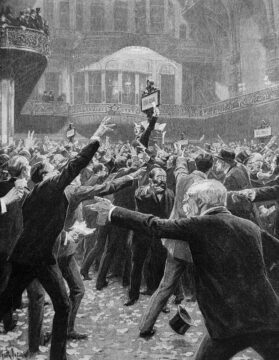Samuel Moyn in The Nation:
 In the chilling speech he gives at the end of the film Margin Call, Jeremy Irons says that no one should say they believe in equality, because no one really thinks it exists: The very idea camouflages the endurance of hierarchy in an essentially unchanging form. “It’s certainly no different today than it’s ever been,” he explains to an underling. “There have always been and there always will be the same percentage of winners and losers….
In the chilling speech he gives at the end of the film Margin Call, Jeremy Irons says that no one should say they believe in equality, because no one really thinks it exists: The very idea camouflages the endurance of hierarchy in an essentially unchanging form. “It’s certainly no different today than it’s ever been,” he explains to an underling. “There have always been and there always will be the same percentage of winners and losers….
Yeah, there may be more of us than there’s ever been, but the percentages? They stay exactly the same.”
For many others, the response to the 2008 financial crisis was very different from Irons’s cynical response. The crisis led to more consciousness and criticism of inequality than had been seen in the past 50 years. Starting with Occupy Wall Street in 2011, large numbers of Americans concerned about the ascendancy of the “1 percent” eventually consolidated around Bernie Sanders’s presidential campaigns in 2016 and 2020. During these years, the French economist Thomas Piketty provided the reading public with evidence that vindicated the movement: In Capital in the Twenty-First Century, published in English in 2014, he confirmed that economic inequality had been rising across the North Atlantic world. Piketty also showed that the situation was simultaneously worse and better than the way Irons had characterized it in Margin Call: Capitalism’s inherent dynamics generally increased inequality, he argued, but political mobilizations could bring about its reduction.
More here.
Enjoying the content on 3QD? Help keep us going by donating now.
